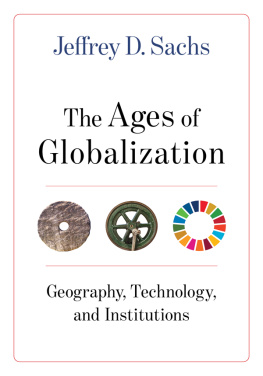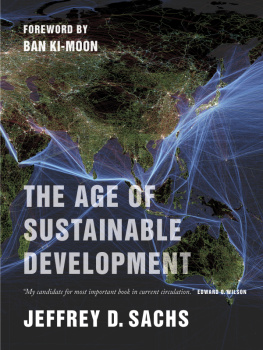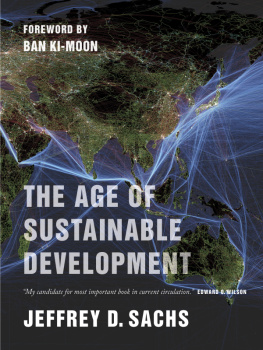Table of Contents
Praise for The Ages of Globalization
This dazzling book makes an invaluable contribution to the debate about the future of globalization by brilliantly summarizing humanitys existential challenges and providing bold ideas for ensuring our survival. Sachs makes a persuasive argument that applying the concept of sustainable development must be todays essential mission. His thoughtful proposals for reforming key international institutions, starting with the UN, merit particular attention. The Ages of Globalization is required reading for our times.
Vuk Jeremi, former president of the United Nations General Assembly
In this erudite yet accessible book, Jeffrey D. Sachs traces the history of modern humans from our migration from Africa some 70,000 years ago to today. In a pathbreaking account, he shows how geography, technology, and institutions drive change. His analysis is indispensable for understanding current global predicaments. A tour de force.
Prasannan Parthasarathi, Boston College
As it comes from Jeffrey D. Sachs, I had expected this book to be analytical, punchy, and readable, and so it is. But it is a pleasure to be able to report that it is also a book by a superstar economist that takes both history and geography seriously and that allows the past, with all its complexities and contingencies, to speak for itself. Impressively broad in both temporal and geographical scope, this is a masterpiece of concision and a great introduction to global economic history.
Kevin ORourke, author of A Short History of Brexit: From Brentry to Backstop
The Ages of Globalization is not just a book for the modern citizen. It is an essential survival kit for the twenty-first century. At the same time that humanity was amassing wealth, it was also creating the means of its own destruction. Now we are facing forces none of us can counter alone, such as climate change and environmental degradation. Sachss call for action resonates with vigor and urgency. With this book, we can better explore, learn, and act.
Miroslav Lajk, minister of foreign and European affairs of the Slovak Republic
At a time when the foundations of the world economic order are being challenged, we must rely on the knowledge accumulated throughout history to make wiser choices for the future of our societies. In The Ages of Globalization, Sachs offers a superb and unique historical and analytical framework for understanding the process of globalization, highlighting its dynamic nature and addressing its social and economic implications. From the Paleolithic Age to the current digital age, this book examines the interplay of geography, technology, and institutions to achieve a comprehensive explanation of how globalization emerges and evolves. Analysts, policy makers, social and political leaders, interested citizens, and anyone concerned with the future of the global economy can draw invaluable lessons from this book.
Felipe Larran B., former minister of finance of Chile
Few scholars have the breadth of knowledge with which to cogently weave insights from such wide-ranging fields such as agronomy, economics, archeology, anthropology, and engineering to recount the layered story of how globalization and development unfolded. As always, Sachs is a treat to read.
Gordon McCord, University of California, San Diego
The Ages of
Globalization
Jeffrey D. Sachs
The Ages of
Globalization
Geography, Technology,
and Institutions
Columbia University Press / New York
Columbia University Press
Publishers Since 1893
New York Chichester, West Sussex
cup.columbia.edu
Copyright 2020 Jeffrey D. Sachs
All rights reserved
E-ISBN 978-0-231-55048-2
Library of Congress Cataloging-in-Publication Data
Names: Sachs, Jeffrey, author.
Title: The ages of globalization : geography, technology, and institutions / Jeffrey D. Sachs.
Description: New York : Columbia University Press, [2020] | Includes bibliographical references and index.
Identifiers: LCCN 2019038327 (print) | LCCN 2019038328 (e-book) | ISBN 9780231193740 (cloth) | ISBN 9780231550482 (e-book)
Subjects: LCSH: Economic history. | World history. | GlobalizationHistory.
Classification: LCC HC21.S224 2020 (print) | LCC HC21 (e-book) | DDC 909dc23
LC record available at https://lccn.loc.gov/2019038327
LC e-book record available at https://lccn.loc.gov/2019038328
A Columbia University Press E-book.
CUP would be pleased to hear about your reading experience with this e-book at .
Cover and title page images
The SDG logo (wheel) is the logo for the Sustainable Development Goals
Please note: The content of this publication has not been approved by the United Nations and does not reflect the views of the United Nations or its officials or Member States. United Nations Sustainable Development Goals web site: https://www.un.org/sustainabledevelopment. All other symbols are royalty free.
Cover design: Lisa Hamm
For Nina
Our familys newest arrival to the Digital Age, with our hopes and aspirations for peace, prosperity, and environmental sustainability.
Contents
T he COVID-19 epidemic hit as this book was going to press. A most global phenomenona pandemic diseasewas suddenly provoking the most local of responses: quarantines, lockdowns of neighborhoods, and the closure of borders and trade. In just three months, the virus spread from Wuhan, China, to more than 140 other countries. In the fourteenth century, the bubonic plague spread the Black Death from China to Italy in the course of some sixteen years, 1331 to 1347. In our time, the pathogen arrived within days by nonstop flight from Wuhan to Rome.
This book is about complexities of globalization, including the powerful capacity of globalization to improve the human condition while bringing undoubted threats as well. The interconnections of humanity across the globe enable the sharing of ideas, the enjoyment of diverse cultures, and the exchanges of diverse and distinctive goods across vast geographies. I savor my morning coffee, which arrives not from the coffee shop across the street but from the sloping tropical hillsides of Ethiopia, Indonesia, and Colombia, thousands of miles away. I delight in having visited these places as well, and have enjoyed their rich cultures and great natural beauty. I have learned from such visits and my work that human kindness, our aspirations for our children, and our enjoyments of life are common to all humanity, no matter how diverse our backgrounds and our material conditions.
The new coronavirus reminds us yet again that the benefits of global trade and travel have always been accompanied by the global spread of disease and other ills. In this book, I will discuss how Adam Smith, the father of modern economics, viewed the voyages of discovery of Christopher Columbus and Vasco da Gama. He wrote that the discoveries of the sea routes from Europe to the Americas and to Asia were the most important events of human history, because they linked all parts of the world in a web of transport and commerce, with vast potential benefits. Smith also wrote, with dismay, that the new sea routes occasioned a massive repression of native societies by European conquerors and colonizers.














